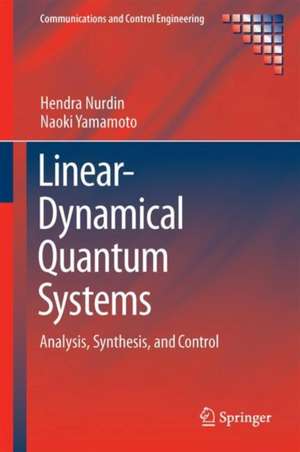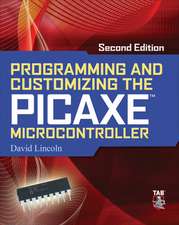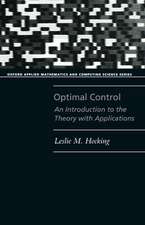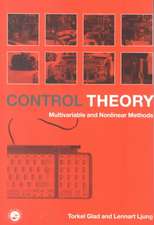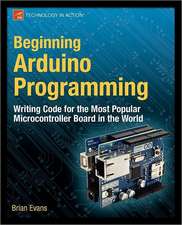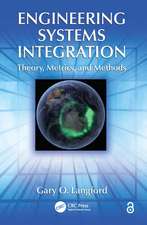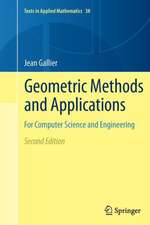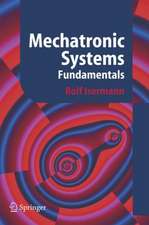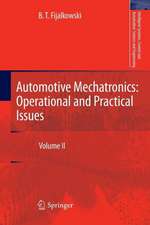Linear Dynamical Quantum Systems: Analysis, Synthesis, and Control: Communications and Control Engineering
Autor Hendra I Nurdin, Naoki Yamamotoen Limba Engleză Hardback – 22 mai 2017
Researchers and graduates studying systems and control theory, quantum probability and stochastics or stochastic control whether from backgrounds in mechanical or electrical engineering or applied mathematics will find this book to be a valuable treatment of the control of an important class of quantum systems. The material presented here will also interest physicists working in optics, quantum optics, quantum information theory and other quantum-physical disciplines.
| Toate formatele și edițiile | Preț | Express |
|---|---|---|
| Paperback (1) | 681.31 lei 38-44 zile | |
| Springer International Publishing – 9 mai 2018 | 681.31 lei 38-44 zile | |
| Hardback (1) | 896.52 lei 3-5 săpt. | |
| Springer International Publishing – 22 mai 2017 | 896.52 lei 3-5 săpt. |
Din seria Communications and Control Engineering
- 18%
 Preț: 953.65 lei
Preț: 953.65 lei - 18%
 Preț: 953.65 lei
Preț: 953.65 lei - 18%
 Preț: 1128.08 lei
Preț: 1128.08 lei - 20%
 Preț: 879.71 lei
Preț: 879.71 lei - 18%
 Preț: 1117.03 lei
Preț: 1117.03 lei - 15%
 Preț: 659.70 lei
Preț: 659.70 lei - 15%
 Preț: 656.89 lei
Preț: 656.89 lei - 18%
 Preț: 1113.26 lei
Preț: 1113.26 lei - 18%
 Preț: 1388.22 lei
Preț: 1388.22 lei - 15%
 Preț: 647.27 lei
Preț: 647.27 lei - 18%
 Preț: 954.45 lei
Preț: 954.45 lei - 18%
 Preț: 1231.47 lei
Preț: 1231.47 lei - 18%
 Preț: 948.92 lei
Preț: 948.92 lei - 18%
 Preț: 1232.57 lei
Preț: 1232.57 lei - 15%
 Preț: 643.34 lei
Preț: 643.34 lei - 18%
 Preț: 1127.28 lei
Preț: 1127.28 lei - 18%
 Preț: 1401.30 lei
Preț: 1401.30 lei - 15%
 Preț: 651.51 lei
Preț: 651.51 lei - 20%
 Preț: 1454.07 lei
Preț: 1454.07 lei - 18%
 Preț: 948.79 lei
Preț: 948.79 lei - 18%
 Preț: 1233.06 lei
Preț: 1233.06 lei - 18%
 Preț: 947.85 lei
Preț: 947.85 lei - 18%
 Preț: 950.96 lei
Preț: 950.96 lei - 18%
 Preț: 956.99 lei
Preț: 956.99 lei - 15%
 Preț: 644.18 lei
Preț: 644.18 lei - 18%
 Preț: 946.87 lei
Preț: 946.87 lei - 18%
 Preț: 951.14 lei
Preț: 951.14 lei - 18%
 Preț: 961.55 lei
Preț: 961.55 lei - 15%
 Preț: 644.18 lei
Preț: 644.18 lei - 20%
 Preț: 990.80 lei
Preț: 990.80 lei - 18%
 Preț: 1006.72 lei
Preț: 1006.72 lei - 18%
 Preț: 942.44 lei
Preț: 942.44 lei - 18%
 Preț: 1233.06 lei
Preț: 1233.06 lei - 15%
 Preț: 641.85 lei
Preț: 641.85 lei - 18%
 Preț: 957.75 lei
Preț: 957.75 lei - 15%
 Preț: 649.87 lei
Preț: 649.87 lei - 18%
 Preț: 958.07 lei
Preț: 958.07 lei - 18%
 Preț: 1117.99 lei
Preț: 1117.99 lei - 18%
 Preț: 1395.94 lei
Preț: 1395.94 lei - 18%
 Preț: 781.62 lei
Preț: 781.62 lei - 18%
 Preț: 953.20 lei
Preț: 953.20 lei - 18%
 Preț: 1109.78 lei
Preț: 1109.78 lei - 18%
 Preț: 947.35 lei
Preț: 947.35 lei
Preț: 896.52 lei
Preț vechi: 1093.31 lei
-18% Nou
Puncte Express: 1345
Preț estimativ în valută:
171.57€ • 178.03$ • 143.40£
171.57€ • 178.03$ • 143.40£
Carte disponibilă
Livrare economică 22 februarie-08 martie
Preluare comenzi: 021 569.72.76
Specificații
ISBN-13: 9783319551999
ISBN-10: 331955199X
Pagini: 262
Ilustrații: XV, 262 p. 68 illus.
Dimensiuni: 155 x 235 mm
Greutate: 0.6 kg
Ediția:1st ed. 2017
Editura: Springer International Publishing
Colecția Springer
Seria Communications and Control Engineering
Locul publicării:Cham, Switzerland
ISBN-10: 331955199X
Pagini: 262
Ilustrații: XV, 262 p. 68 illus.
Dimensiuni: 155 x 235 mm
Greutate: 0.6 kg
Ediția:1st ed. 2017
Editura: Springer International Publishing
Colecția Springer
Seria Communications and Control Engineering
Locul publicării:Cham, Switzerland
Cuprins
Introduction.- Mathematical Modeling of Linear Dynamical Quantum Systems.- Realization Theory and Network Synthesis of Linear Dynamical Quantum Systems.- Estimation and Filtering for Linear Dynamical Quantum Systems.- Feedback Control of Linear Dynamical Quantum Systems.- Linear Systems and Control Theory for Quantum Information.
Notă biografică
Dr. Hendra I. Nurdin holds a bachelor's degree in electrical engineering from Institut Teknologi Bandung, Indonesia, a master's degree in engineering mathematics from the University of Twente, the Netherlands, and a PhD degree in engineering and information science from the Australian National University (ANU) in 2007. From 2007 to 2011 he was a Research Fellow and then an Australian Research Council (ARC) APD Fellow at the ANU before joining the University of New South Wales (UNSW) Australia in 2012, where he has since been a Senior Lecturer. Dr Nurdin has held two ARC Discovery Project grants and is a Senior Member of the Institute of Electrical and Electronic Engineers (IEEE). He is the author or co-author of more than 30 peer-reviewed journal articles and a similar number of conference proceedings papers. His research interests include quantum systems, quantum feedback control, stochastic systems and stochastic control, and the application of control theoryto power systems.
Naoki Yamamoto received the B.S. degree in engineering, the M.S. degree in information physics, and the Ph.D. degree in computing from the University of Tokyo, Tokyo, Japan, in 1999, 2001, and 2004, respectively. From 2003 to 2007 he was a Research Fellow of the Japan Society for the Promotion of Science. From 2004 to 2006 he was a Visiting Researcher at the California Institute of Technology, Pasadena, and from 2007 to 2008 he was a Research Fellow at Australian National University, Canberra. He is currently an Associate Professor at Keio University, Yokohama, Japan. He is an author or co-author of more than 40 peer-reviewed journal articles and conference proceedings papers. His current research interests are in quantum engineering including control, system identification, and filtering, in the quantum information context.
Naoki Yamamoto received the B.S. degree in engineering, the M.S. degree in information physics, and the Ph.D. degree in computing from the University of Tokyo, Tokyo, Japan, in 1999, 2001, and 2004, respectively. From 2003 to 2007 he was a Research Fellow of the Japan Society for the Promotion of Science. From 2004 to 2006 he was a Visiting Researcher at the California Institute of Technology, Pasadena, and from 2007 to 2008 he was a Research Fellow at Australian National University, Canberra. He is currently an Associate Professor at Keio University, Yokohama, Japan. He is an author or co-author of more than 40 peer-reviewed journal articles and conference proceedings papers. His current research interests are in quantum engineering including control, system identification, and filtering, in the quantum information context.
Textul de pe ultima copertă
This monograph provides an in-depth treatment of the class of linear-dynamical quantum systems. The monograph presents a detailed account of the mathematical modeling of these systems using linear algebra and quantum stochastic calculus as the main tools for a treatment that emphasizes a system-theoretic point of view and the control-theoretic formulations of quantum versions of familiar problems from the classical (non-quantum) setting, including estimation and filtering, realization theory, and feedback control. Both measurement-based feedback control (i.e., feedback control by a classical system involving a continuous-time measurement process) and coherent feedback control (i.e., feedback control by another quantum system without the intervention of any measurements in the feedback loop) are treated.
Researchers and graduates studying systems and control theory, quantum probability and stochastics or stochastic control whether from backgrounds in mechanical or electrical engineering or applied mathematics will find this book to be a valuable treatment of the control of an important class of quantum systems. The material presented here will also interest physicists working in optics, quantum optics, quantum information theory and other quantum-physical disciplines.
Researchers and graduates studying systems and control theory, quantum probability and stochastics or stochastic control whether from backgrounds in mechanical or electrical engineering or applied mathematics will find this book to be a valuable treatment of the control of an important class of quantum systems. The material presented here will also interest physicists working in optics, quantum optics, quantum information theory and other quantum-physical disciplines.
Caracteristici
Equips readers to translate knowledge of influential classical stochastic systems to the quantum world Employs many examples to illustrate the modelling of real physical systems in linear-dynamical-quantum terms Allows the reader to compare detailed descriptions of a number of important control-related techniques under both classical and quantum regimes Includes supplementary material: sn.pub/extras
